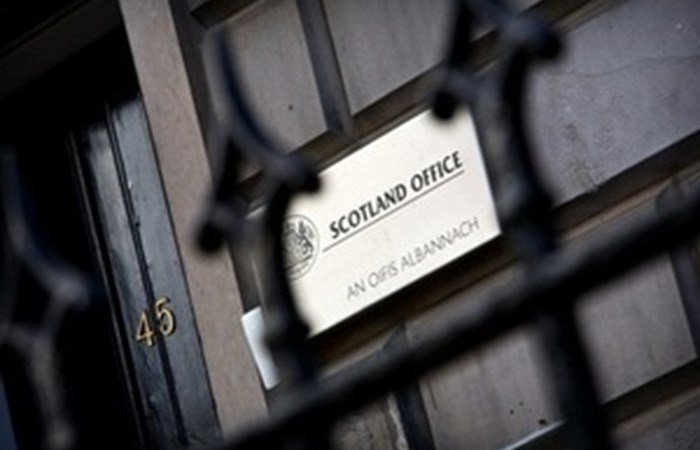Scotland Office

When Scotland voted to stay in the United Kingdom the agreement was that the Scottish Parliament would become one of the most powerful devolved parliaments in the world and that Scotland would hold on to the benefits of being part of the UK.
On Wednesday the Scottish Parliament unanimously backed the UK Governments legislation to make Holyrood one of the most powerful devolved parliaments in the world.
Since September 2014, the UK Government has also delivered on the other side of our promise the commitment that Scotland would continue to benefit from being part of the UK and play a full role in the great work the UK does at home and abroad.
The referendum was a historic decision by the people of Scotland who are now getting on with their lives. Meanwhile, the UK Government is getting on with what people expect us to do protecting our people, growing our economy, creating opportunities at home and stepping in to help some of the most vulnerable people in the world. Below are some of the things the UK Government has been getting on with.
Secretary of State for Scotland David Mundell said:
The Scottish Parliaments approval of the Scotland Bill is a historic step which helps transform devolution. The UK Government has kept our promise to make Holyrood one of the most powerful devolved parliaments in the world while ensuring Scotland still holds on to the benefits of being part of the UK.
Since the referendum in 2014 Scotland has been at the heart of UK efforts to improve our national security, grow the UK economy and to offer help to some of the most vulnerable people in the world. The UK Government is getting on with it and Scotland is playing its part.
Delivering for Scotland
- Scotland has 2.6 million people in work and a higher employment rate than England, Wales and Northern Ireland.
- Millions of UK pensioners will benefit from the biggest real terms increase to the state pension for 15 years.
- A new National Living Wage means that anyone 25 or over on the minimum wage in the UK will get a pay rise from this April.
- The UK Government spends 0.7% of our GDP on international aid and we supported the amazing efforts of our NHS staff, military, charities and aid workers who helped to fight the Ebola outbreak in West Africa.
- The UK shares a strong currency and UK interest rates, mortgage rates and inflation have been kept at historically low levels.
- The UK Government has stepped into to help the oil and gas industry at a difficult time when the price of oil has fallen by around two-thirds.
- UK consular staff around the world helped more than 17,000 British nationals and issued nearly 38,000 emergency travel documents in 2014/15.
- UK Aid has helped 11 million children through school in the last 5 years.
- The UK economy has enjoyed 12 successive quarters of growth during a turbulent time for the world economy.
- 122 elite Scottish athletes are being financially supported by 35 million of UK funding to help them perform to the best of their ability at the Rio Olympics.
- The UK Government is changing the law so that all companies with more than 250 employees need to publish details of the pay gap between their male and female staff.
- The new Transpennine rail contract means there will be 31 new state of the art 125mph trains running on cross-border services, helping to transport the 8 million rail journeys that people make to and from Scotland and the rest of the UK each year.
- The UK Government is hosting centenary commemorations for the Battle of Jutland in Orkney in May this year.
- Nine new Maritime Patrol Aircraft will be stationed at RAF Lossiemouth in Moray and play a vital role in protecting the whole of the UK.
- Out of a total of 1.8bn Research Council funding for UK universities and Higher Education Institutes (HEI) in 2014/15, 264m went to Scotland, which is 15% of the HEI Research Council funding.
- The UK is now investing over 3 billion to improve our cyber security and to help protect people all across the UK who bank and shop online.
- The UK is now doubling our total contribution to the Syria crisis to 2.3 billion this is the UKs largest ever response to a single humanitarian crisis.
- The UK hosted a conference in London in February which raised $11 billion for Syrian refugees the most amount of money ever raised in a single day for a humanitarian crisis.
- The UK Government continues to use the Barnett formula so that Scotland receives a fair share of any new devolved spending in England and Wales. This means that Scotlands schools and hospitals are supported by UK funding.
- The new Fiscal Framework agreement means that Scotland will continue to benefit from financial sharing risks and rewards with the rest of the UK when it comes to raising taxes and public spending.
- The UK led the international response to the Ebola outbreak in Sierra Leone. 250 UK Government staff worked on the crisis along with 1500 British military personnel and 150 NHS volunteers from the UK who were all deployed to Sierra Leone. The UK provided training for 4000 Sierra Leonean and international healthcare workers as well as 1500 beds and 200 vehicles.
